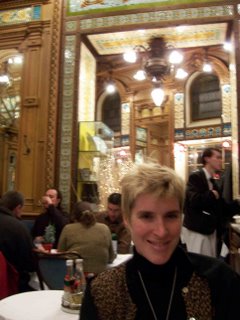 Eyewear is very glad to welcome Lisa Pasold (pictured here in a brasserie in Nantes) to its pages this Friday. She has become one of the core poets in the new 21st century Paris expat literary scene, along with Jennifer K Dick and Michelle Noteboom.
Eyewear is very glad to welcome Lisa Pasold (pictured here in a brasserie in Nantes) to its pages this Friday. She has become one of the core poets in the new 21st century Paris expat literary scene, along with Jennifer K Dick and Michelle Noteboom.It was good to meet her when I lived in that city for several years, in 2001-2003. Indeed, I was so taken with her poetry, I included it in my survey of 20 younger Canadian poets published in the 2005 issue of New American Writing. One of the things I like about her writing is how she gets so much of the world in to it, without ever easing up on innovative practice - while retaining humour and perspective - making fast-paced avant-garde work with a voice behind it, mixing narrative and more opaque strategies in a new blend.
Pasold is nothing if not active and travelled - she's been thrown off a train in Belarus, been fed the world’s best pigeon pie in Marrakech, mushed huskies in the Yukon, and been cheated in the Venetian gambling halls of Ca’ Vendramin Calergi.
She grew up in Montreal (as did I - we debated against each other in high school then promptly forgot each other for nearly 20 years) which gave her the necessary jaywalking skills to survive as a journalist and guidebook writer.
Her first book of poetry, Weave, appeared in 2004 and was nominated for an Alberta Book Award. She currently lives in Paris and teaches creative writing at the American University in Paris. Her new book of poetry, A Bad Year for Journalists, came out this April.
what’s possible
“Hidden agendas: How journalists influence the news”
she reads. that’s just fan-tas-tic, I knew they’d get
to blaming us one of these days.
it’s a simple job, “radicalizing the pain of others.” Or selling it.
because she's there to make money off their situation. at least,
they think she is.
can you sell this?
so they throw shit at the car. their own shit. towards her.
splatter the windshield.
(if she worked, say, for FOX, she could skip
this, make it up as she went along. like whistling a tune.)
where’s her handy pith helmet and guidebook? in the Strand once
she came across Directions for Englishmen
Going to India. 19th century binding opened in her hand
to page 41. Bodoni Book font, smudged advice:
"Stand still and wave a white handkerchief. This should
confuse the elephant."
there was no illustration.
but the handkerchief remains, the elephant pauses
to decipher meaning
—truce? surrender? you're
about to blow your nose?—the elephant’s hesitation
an opportunity:
Run. Run away.
Keep driving, she says now from the passenger seat.
Just keep driving.
poem by Lisa Pasold
from A Bad Year for Journalists, www.frontenachouse.com
Comments